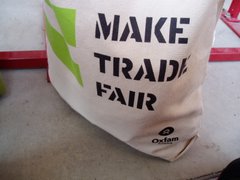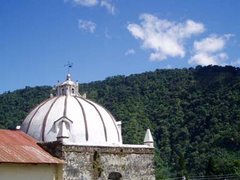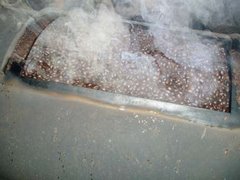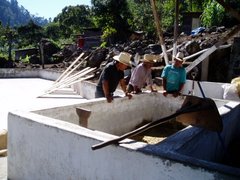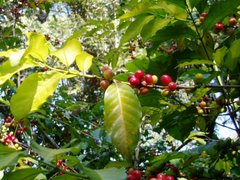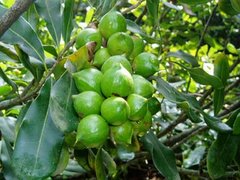My wife's family attends a Methodist church in Marengo, IL. Awhile ago, her dad introduced me to a guy who was in the process of setting up a fair trade coffee ordering co-op for their congregation. His name is Brian Standley. I asked Brian to send along an update on his and others efforts within their church to promote fair trade (see below). Brian said that if anyone is interested in learning more about doing something like this in their church he would be happy to share more with them. Just post a comment on the blog and I'll put you in touch with him.
I will make an effort to share fair trade success stories like this and feature other interesting trade justice initiatives on the blog from time to time.
Here is what Brian tells us about the UMCOR Fair Trade Co-op at Marengo Methodist:
We started the Co-Op soon after Halloween. Our Wesley Fellowship Group did a Halloween Outreach for the neighborhood trick-or-treaters where we gave out free coffee and hot chocolate. I volunteered to get the coffee and hot chocolate. I had heard about the United Methodist Committee on Relief (UMCOR) Coffee Project some time ago and was always curious about how it worked. Now I had an excuse to try it out. Both the coffee and hot chocolate were reasonably priced and (of course) delicious. We had many happy kids and parents that night (it was kinda cold). Afterwards, I had some extra coffee left over, so I hit on the idea of giving it away to the congregation to see if there was interest in beginning a co-op. I seperated
it into 1/2 pound bags, made my pitch during church, and gave it away on a Sunday in November 2006. Some people were a little shocked that I wasn't charging anything for the samples. Then I stood back and waited for the response. Within a few weeks, people started asking me when there was going to be more coffee. With the holidays approaching, I decided to wait until January to make our first order.
On January 14th, I put an order form in the worship bulletin offering one choice of regular coffee and one choice of decaf (both whole bean or ground). I also let people know that tea and hot chocolate was available as well. The response was better than I had anticipated. Sixteen people made orders that day and since then we've had three more orders totaling over $1,100 of coffee, tea, and hot chocolate. The church is also now buying the coffee for fellowship hour from the UMCOR Coffee Project.
I've made some tweeks in the process since that first order, but it basically remains the same. About every six weeks, I choose one regular and one decaf coffee and create an order form. I leave the order form by a container in the lobby for people to place their orders any time during the six week period. The week orders are due, I put a reminder in the bulletin and I set up a "Taste of Justice" stand-up display in front to the ordering container to jog people's memories. The coffee normally comes in a week to ten days later and we hand it out after worship services.
Lately I've been putting notes and cards in peoples bags reminding them of the next ordering date and encouraging them to share their coffee with their friends and neighbors that don't go to our church. With our next order I will be putting in stories about the farmers they are helping to give them some connection to their buying choices. It's my hope that folks will begin
to see this not just a way to get a great cup of coffee but also begin to see the impact of all their purchases and begin asking, "what would Jesus buy?"
As we approach the one year anniversary of the co-op in November, I'm going to try to have a Fair Trade Sunday to re-engage folks in the purpose (and the people) behind the coffee. The experience has truly been a blessing in my life. I spent some time within the coffee growing regions of Guatemala, so I can see in my mind's eye the faces of those we are helping. It's such a simple thing: an honest day's wage for an honest day's work for a product we can't even grow in this country (with all due respect to Kona). Who could argue with that?
The UMCOR Coffee Project (along with seven other denominational efforts) is part of the larger Interfaith Coffee Program administered by Equal Exchange.
Monday, July 30, 2007
A Coffee Tale

My friend Ted Erski teaches in the earth science department at McHenry County Community College in Crystal Lake, IL. A coffeeholic and geographer, he has developed an amazing course called the Geography of Coffee. He also finished his first self-published novel called Salavandra: A Coffee Tale. Ted did several readings from the book in area cafes that support fair trade. I asked him to write up a synopsis of the book and his interests for the blog. You can order the book from Amazon.com or download a free audio copy.
"My current professional interests lie in globalization, social development and the interplay amongst economics, politics and the environment. I'm most interested in how coffee, an ostensibly simple commodity, connects consumers in the developed world with producers in the developing world. To this end I created a course called “The Geography of Coffee.” The nuanced, politically and economically charged character of this global commodity also inspired my first novel, Salavandra: A Coffee Tale. The story is about a revolution on a coffee-producing island. More significantly, however, it offers readers a critique of US trade policy, globalization and international labor conditions.
I use the novel in my geography classes. Here are three questions I ask my students about the text:
1. Compare and contrast communication infrastructure and access to information and technology between the developed and developing world as represented in the first three chapters of Salavandra. What might the term "the digital divide" mean in the context of Salavandra's first three chapters?
2. In Chapter four, what symbolizes the conflicting view about the value of natural resources between the developed and developing world?
Thinking about Chapters four through six, describe how Salavandra illustrates that access to information can level the playing field for advocates of working people in the developing world.
3. Thinking about chapters seven through nine, how does Salavandra illustrate that politics and business often work together, and what is often beneficial to consumers in the developed world can actually harm producers in the developing world?"
Ted became an individual member of Chicago Fair Trade (www.chicagofairtrade.org) in May.
Subscribe to:
Posts (Atom)
